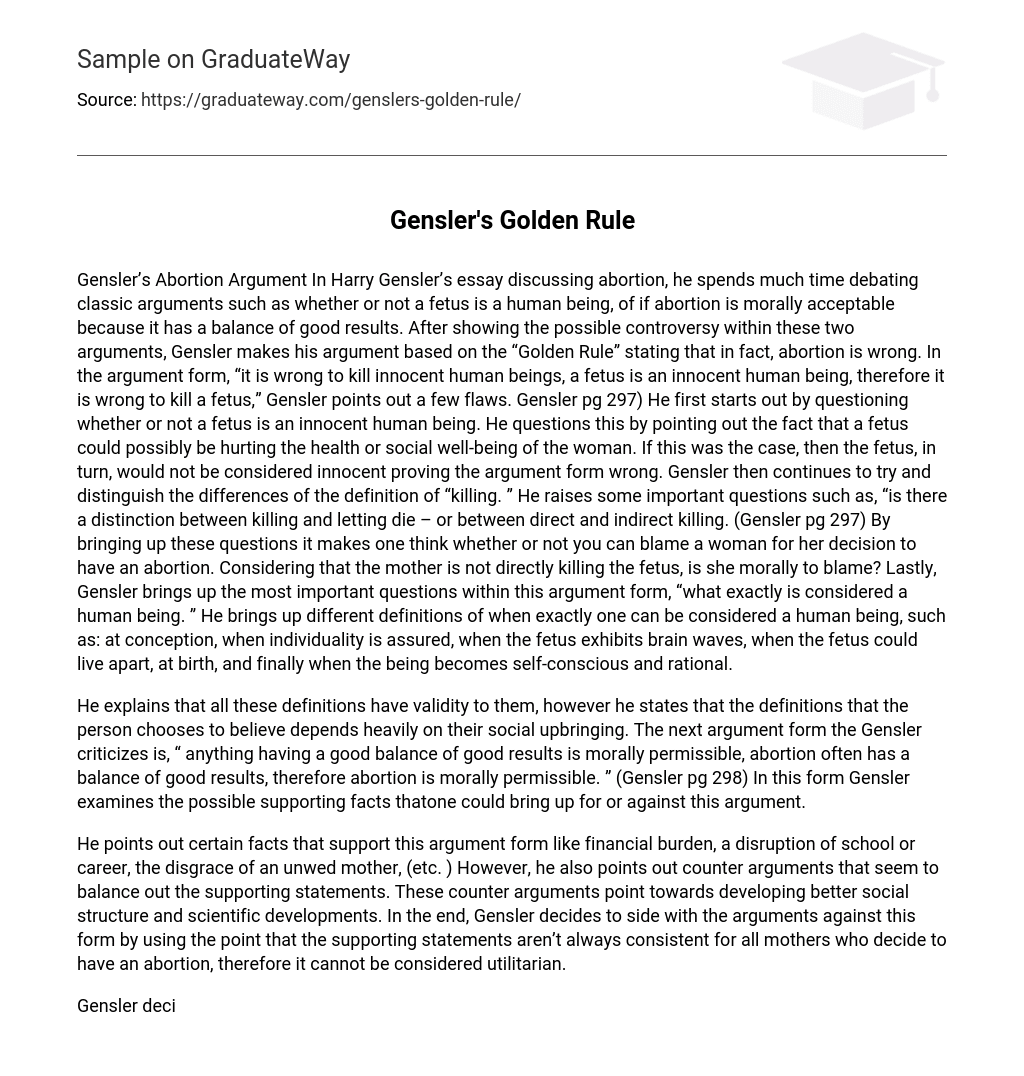Gensler’s Abortion Argument In Harry Gensler’s essay discussing abortion, he spends much time debating classic arguments such as whether or not a fetus is a human being, of if abortion is morally acceptable because it has a balance of good results. After showing the possible controversy within these two arguments, Gensler makes his argument based on the “Golden Rule” stating that in fact, abortion is wrong. In the argument form, “it is wrong to kill innocent human beings, a fetus is an innocent human being, therefore it is wrong to kill a fetus,” Gensler points out a few flaws. Gensler pg 297) He first starts out by questioning whether or not a fetus is an innocent human being. He questions this by pointing out the fact that a fetus could possibly be hurting the health or social well-being of the woman. If this was the case, then the fetus, in turn, would not be considered innocent proving the argument form wrong. Gensler then continues to try and distinguish the differences of the definition of “killing. ” He raises some important questions such as, “is there a distinction between killing and letting die – or between direct and indirect killing. (Gensler pg 297) By bringing up these questions it makes one think whether or not you can blame a woman for her decision to have an abortion. Considering that the mother is not directly killing the fetus, is she morally to blame? Lastly, Gensler brings up the most important questions within this argument form, “what exactly is considered a human being. ” He brings up different definitions of when exactly one can be considered a human being, such as: at conception, when individuality is assured, when the fetus exhibits brain waves, when the fetus could live apart, at birth, and finally when the being becomes self-conscious and rational.
He explains that all these definitions have validity to them, however he states that the definitions that the person chooses to believe depends heavily on their social upbringing. The next argument form the Gensler criticizes is, “ anything having a good balance of good results is morally permissible, abortion often has a balance of good results, therefore abortion is morally permissible. ” (Gensler pg 298) In this form Gensler examines the possible supporting facts thatone could bring up for or against this argument.
He points out certain facts that support this argument form like financial burden, a disruption of school or career, the disgrace of an unwed mother, (etc. ) However, he also points out counter arguments that seem to balance out the supporting statements. These counter arguments point towards developing better social structure and scientific developments. In the end, Gensler decides to side with the arguments against this form by using the point that the supporting statements aren’t always consistent for all mothers who decide to have an abortion, therefore it cannot be considered utilitarian.
Gensler decides to sum up his essay with his own argument form against abortion that follows the standards of the “Golden Rule,” do unto others as you would like them to do unto you. He uses many examples to back his argument form up. One of the examples involves robbing a person. Gensler states that if I thought it would be alright to rob “Jones,” but I don’t think that it would be alright for someone to rob me in the same circumstances, then it is a violation of universalizability and it is inconsistent. Gensler pg 299) Gensler also takes us through an in depth explanation of how to examine his “golden rule argument. ” He suggests that one should not literally use the same circumstances, but think of the dilemma in terms of your thought process now. An example he uses involves messing with a dead person’s will. He states that one should ask the question “would I want someone messing with my will after I had died? ” He also provides an example of how not to examine the question, “considering I am dead, would I then (while dead) consent to this action? He finishes up by stating that if one uses the argument form correctly then it would be extremely hard to deny that abortion is not morally permissible. In conclusion, Gensler states that although there has been many past arguments arguing for or against abortion that have had many holes in them, if one applies his “golden rule” thought process to the dilemma then the results will be universal which makes abortion wrong.





